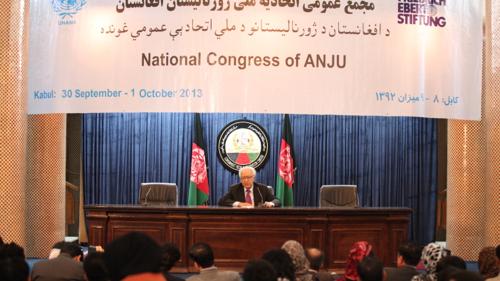KABUL - More than 200 journalists from around Afghanistan gathered today in the capital, Kabul, to take part in the first-ever national congress of one of the country’s leading unions for media workers.
Facilitated by the United Nations Assistance Mission in Afghanistan (UNAMA) and Friedrich Ebert Stiftung, a German foundation, the three-day gathering of members of the Afghanistan National Journalists’ Union (ANJU) is aiming to review the body’s constitution, elect a board-like High Council and hold panel discussions on the role of journalists in elections and the need for a journalism code of ethics, in addition to providing the opportunity to share experiences and knowledge in person.
Speaking at the inauguration of the congress, the current ANJU President, Abdul Hamid Mobarez, highlighted the achievements made by the Afghan media over the past decade, while also flagging the challenges that lay ahead, such as the need to improve the quality of journalism by adopting a code of ethics and the need for more investigative reporting.
“Afghanistan is passing through a critical phase of transition where Afghan security forces are taking over complete security responsibilities from the internationals while, at the same time, a transfer of political power will take place through a democratic elections in April next year,” said Mr. Mobarez.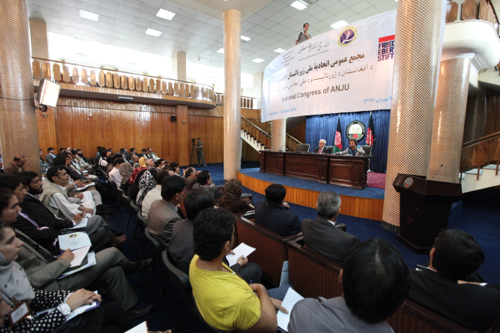
He called on the Afghan media to take a responsible approach to mobilizing the public so that it can respond positively to the country’s security and political transition processes, particularly through active participation in the upcoming elections, in order to prove to the world that Afghan society has progressed.
Afghanistan is slated to hold an election on 5 April next year to choose its new leader, replacing President Hamid Karzai. The following year, Afghanistan will hold elections for its National Assembly. UN officials have previously stated that next year’s polls are critical to future stability of Afghanistan and continued international support.
The political transition coincides with security transition. In June, the Afghan security forces, for the first time since 2001, assumed full responsibility of securing their country from their international allies, who are ending their combat mission by the end of 2014.
The journalists gathered in Kabul hailed from 21 of Afghanistan’s 34 provinces. ANJU was established in 1980 to defend the rights of Afghan journalists, build their capacity and advocate for necessary legislation to ensure freedom of the press.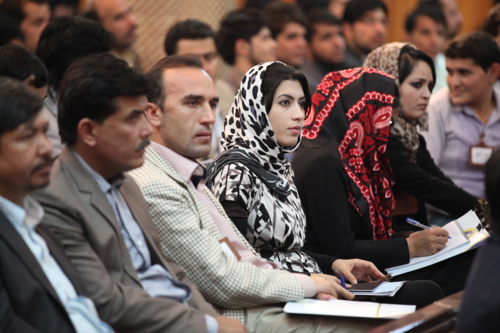
However, over the past 33 years, the union had been unable to convene a national congress and the 44 members of its current High Council were appointed by ANJU’s president and executive committee instead of being elected through a democratic process.
The United Nations supports the fundamental principles of press freedom and the role played by the media in society. The world body has previously noted that independent, free and pluralistic media have a crucial role to play in the good governance of democratic societies, by ensuring transparency and accountability, promoting participation and the rule of law, and contributing to the fight against poverty.
ANJU’s President noted that Afghanistan has experienced a degree of media freedom since the fall of the Taliban regime some 12 years ago, but emphasized that that freedom is now under threat.
“The lower house of the Afghan Parliament (Wolesi Jirga) has changed the Mass Media Law by making the Minister of Information and Culture the head of the High Council of Media and the Oversight Committee for Assessment of Media Violations,” said Mr. Mobarez, adding that this action had, in effect, the potential to restrict the independence of the media in Afghanistan.
The Wolesi Jirga approved the latest version of the Mass Media Law – containing the amendments which have drawn concern from media groups over the possibility of interference from the Ministry of Information and Culture – earlier in September. The draft law is now set to go before the upper house of the Afghan Parliament, the Mishra Jirga, and, if approved as currently drafted there, it goes before the President to be signed into law.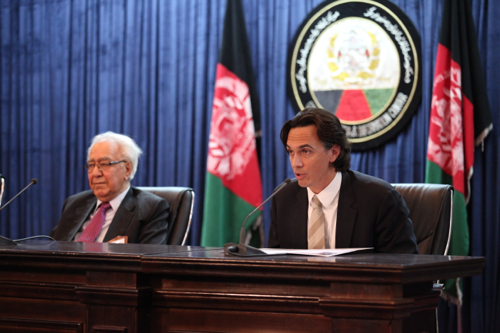
In his comments to the opening of the national congress, the Deputy Director of UNAMA’s Strategic Communication and Spokespersons’ Unit, Ari Gaitanis, welcomed the holding of the event.
“I don’t need to tell you just how important the role of journalism is in society – it plays a very vital role, and has been doing so in Afghan society for some time and I’m sure the discussions you will have here over the next three days will only reinforce that role,” said Mr. Gaitanis. “UNAMA is pleased to help facilitate this gathering and I wish you fruitful and productive discussions.”
In his speech, the Executive Director of ANJU, Faheem Dashty, covered a wide range of issues related to the work of journalists in Afghanistan as well as the strengthening of the union.
He said it currently has 897 members and that there are plans to extend its membership to the remaining 13 provinces of Afghanistan, lifting its membership to 3,000 by the end of 2014. In addition, ANJU has planned training programmes to build the skills-base of journalists in five provinces – Balkh, Khost, Herat, Nangarhar and Kabul.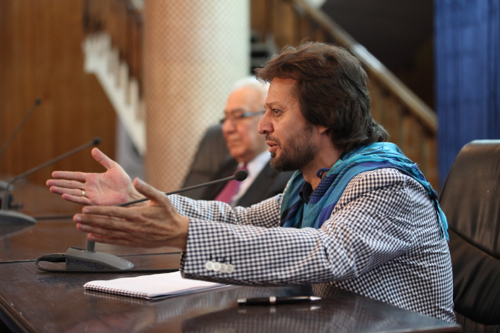
Mr. Dashty also said that defending the rights of Afghan journalists and effort to improve the legal framework in which they work in were among ANJU’s key achievements.


